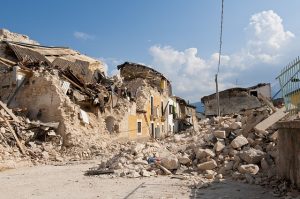 Un chapitre d’ouvrage intitulé « Challenges in Establishing Cross-Border Resilience » vient de paraitre dans l’ouvrage Urban Disaster Resilience and Security dans la collection Springer. Ce chapitre est le fruit de la collaboration entre le CRC, l’université de Paris-Dauphine, l’Institut de Technologie de Karlshruhe et l’université de Wuppertal dans le cadre du projet ANR – DFG INCA (A decision support framework for improving cross-border area resilience to disasters).
Un chapitre d’ouvrage intitulé « Challenges in Establishing Cross-Border Resilience » vient de paraitre dans l’ouvrage Urban Disaster Resilience and Security dans la collection Springer. Ce chapitre est le fruit de la collaboration entre le CRC, l’université de Paris-Dauphine, l’Institut de Technologie de Karlshruhe et l’université de Wuppertal dans le cadre du projet ANR – DFG INCA (A decision support framework for improving cross-border area resilience to disasters).
Abstract du chapitre : This chapter focuses on resilience stakes that characterize urbanizing cross-border regions. While cross-border regions are characterized by multiple sources of vulnerabilities that are inherent to their development and history, knowledge remains partial in relation to how these regions address disasters that could affect both sides of the frontier. For decades, most cross-border regions have been expanding both from economical and institutional perspectives. In the meantime, urban density has been increasing, as well as the complexity of critical infrastructures—for instance, transportation or electricity distribution—that support essential services such as health care. Due to such complexity, these infrastructures represent major vulnerabilities for cross-border regions nowadays. In addition, borderland citizens’ behaviours remain uncertain, due to history and co-existing diverse cultural backgrounds. The chapter introduces the concept of resilience as a valuable lens to investigate disaster management of cross-border regions. More specifically, this chapter proposes to draw on resilience methodologies to address risks related to infrastructure, organization and behaviours in cross-border regions. By doing so, the chapter contributes to a holistic perspective on these vulnerabilities and their management when a disaster strikes. While a large spectrum of European projects has taken into consideration some of cross-border regions’ specificities, a comprehensive approach to cross-border resilience is still missing. We illustrate the relevance of this approach with the example of the French–German cross-border region. Going further, the chapter presents the INCA project that relies on multidisciplinary investigation of cross-border resilience and will deliver an agent-based model to support decision-making in cross-border regions facing disasters.







